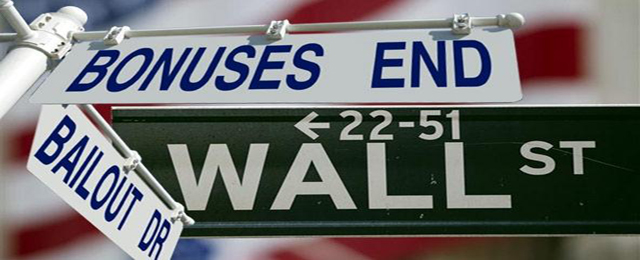Lets imagine that a huge big building crashes in the centre of London. Luckily, no one gets killed but damages run to millions, the whole area is disrupted, causing further financial damages and troubles for people and businesses for weeks and months and even years. How would this incident be treated? Would the authorities just say that this was tough luck and let it be? No, I very much doubt it. This incident would be investigated to the core and no one would rest until the cause was found. Also to make sure other buildings could not just suddenly and unexpectedly collapse. If it was then found there was willful negligence, corners cut to make more money and there would be emails and other evidence to show it those to blame would be prosecuted and their case brought to court.
The financial collapse, not just in Iceland but here in the UK and elsewhere was like a huge big building – indeed many of them – crashing. No, no one died but the financial damage has been great, shocks and after-shocks, lives and societies disrupted and upset.
Following the collapse of the three largest banks in Iceland in October 2008, the parliament decided on two things: one, to set up a special investigative commission, the SIC commission, that would clarify all aspects of the collapse, causes and failures in the running up to the collapse. This report, 2600 pages in 9 volumes (with some digital appendixes) came out in April 2012.
The chapters on the banks tell well documented stories of their lending practices, how some of the largest shareholders used the banks like their private banks, loans against no or weak collaterals, lending beyond legal limits and so on. A true thriller beating all financial fiction.
The other measure was to set up an office of a special prosecutor. No one applied. Finally, a sherif from Akranes, a small town on the bay opposite Reykjavík, was talked into taking on the job, Ólafur Þór Hauksson. He had no experience and no resources. Eva Joly was brought to Iceland to tell Icelanders and the authorities that staff and resources would be needed, this would take a long time and be costly. Eventually, three other prosecutors were hired and when the Office was at its biggest there were over 100 people working there. Now it’s being reduced and the cuts of the new centre-right government have also been sensed there.
Already in the SIC report there were stories that raised questions about possible criminal activities. The al Thani loan saga was one of them. Further, the OSP has now charged the top managers in all the three banks. The al Thani case was the first big case to reach sentencing. The three Kaupthing managers now sentenced are also charged in another large market manipulation case, as are managers from Landsbanki and Glitnir (on both cases see here).
Ólafur Ólafsson, Kaupthing’s second largest shareholder, was also charged in the al Thani case and now sentenced. Other earlier high-fliers charged earlier are Jón Ásgeir Jóhannesson, Glitnir’s largest shareholder and also Hannes Smárason, once a close business partner of Jóhannesson and then recently called in by Kári Stefánsson CEO of the genome company deCode, where Smárason was once a CFO, to run a company in the US. After the charges Smárason stepped down from the post.
But what about the UK? The Serious Fraud Office investigated Kaupthing but dropped the investigation after serious mistakes were done. Libor rigging was at first only investigated as if it was a natural disaster so no person was culpable. A bank rigged Libor, a bank got fined – and yet a bank is made up of people who think, plan and act.
The SFO is now investigating Libor rigging as possibly criminal activities and some people have been charged. Who are these people? Traders and others who actually carried out the alleged criminal activities. Are we to believe that they took up this pastime of fixing libor just for the fun of it? However it could happen it means that those in charge of these banks did a rather poor job of overseeing them. Shouldn’t that failure be investigated?
Every day seems to bring news of banks being fined – there are record fines, ever bigger fines, ever more serious deeds and banks are still more willing to buy sovereign bonds or some financial product with the cheap money they get from governments rather than dirtying their hands on servicing companies. There is libor rigging, money laundering, selling swaps that customers lose money on, currency rate rigging and alleged driving companies into bankruptcy rather than helping them to restructure – all of these “oversights” are treated as if they were carried out by machines and systems, not by reasoning and calculating people of flesh and blood. And for some reason shareholders patiently see their dividend capped by fines and yet say nothing.
When asked about the ongoing investigations in Iceland by non-Icelandic journalist they often seem to assume that there is something special about bankers being investigated; that this is somehow because something is different in Iceland, perhaps the law, perhaps that smallness. No, there is nothing special about Iceland in this respect. Deeds were done, they looked suspicious, there are laws against which these deeds can be tested and then a prosecutor brings charges if there are enough reasons to assume something criminal could have been going on. This is normal if someone robs a car or causes something as disastrous as a house collapse. When banks and banking systems collapsed it suddenly seemed something else had gone on. The strange thing is not why bankers are being prosecuted in Iceland – but why this is not happening elsewhere to the same degree.
*Read the original blog post at Sigrún Davíðsdóttir’s Icelog.






Be the first to comment on "Why are bankers investigated in Iceland and not so much elsewhere?"